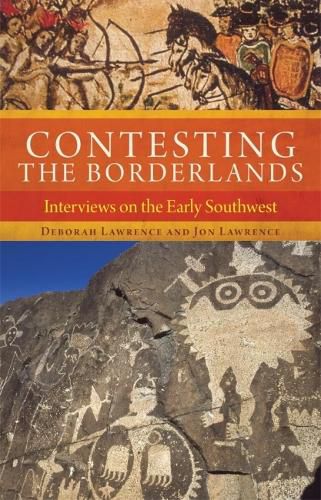Readings Newsletter
Become a Readings Member to make your shopping experience even easier.
Sign in or sign up for free!
You’re not far away from qualifying for FREE standard shipping within Australia
You’ve qualified for FREE standard shipping within Australia
The cart is loading…






Conflict and cooperation have shaped the American Southwest since prehistoric times. For centuries indigenous groups and, later, Spaniards, French, and Anglo-Americans met, fought, and collaborated with one another in this border area stretching from Texas through southern California. To explore the region’s complex past from prehistory to the U.S. takeover, this book uses an unusual multidisciplinary approach. In interviews with ten experts, Deborah and Jon Lawrence discuss subjects ranging from warfare among the earliest ancestral Puebloans to intermarriage and peonage among Spanish settlers and the Indians they encountered.
The scholars interviewed form a distinguished array of archaeologists, anthropologists, ethnohistorians, and historians: Juliana Barr, Brian DeLay, Richard and Shirley Flint, John Kessell, Steven LeBlanc, Mark Santiago, Polly Schaafsma, David J. Weber, and Michael Wilcox. All speak forthrightly about complex and controversial issues, and they do so with minimal academic jargon and temporizing, bringing the most reliable information to bear on every subject they discuss. Themes the authors address include the origin and scope of conflicts between ethnic groups and the extent of accommodation, cooperation, and cross-cultural adaptation that also ensued. Seven interviews explore how Indians forced colonizers to modify their behavior. All of the experts explain how they deal with incomplete or biased sources to achieve balanced interpretations.
As the authors point out, no single discipline provides a complete, accurate historical picture. Spanish documents must be sifted for political and ideological distortion, the archaeological record is incomplete, and oral traditions erode and become corrupted over time. By assembling the most articulate practitioners of all three approaches, the authors have produced a book that will speak to general readers as well as scholars and students in a variety of fields.
$9.00 standard shipping within Australia
FREE standard shipping within Australia for orders over $100.00
Express & International shipping calculated at checkout
Conflict and cooperation have shaped the American Southwest since prehistoric times. For centuries indigenous groups and, later, Spaniards, French, and Anglo-Americans met, fought, and collaborated with one another in this border area stretching from Texas through southern California. To explore the region’s complex past from prehistory to the U.S. takeover, this book uses an unusual multidisciplinary approach. In interviews with ten experts, Deborah and Jon Lawrence discuss subjects ranging from warfare among the earliest ancestral Puebloans to intermarriage and peonage among Spanish settlers and the Indians they encountered.
The scholars interviewed form a distinguished array of archaeologists, anthropologists, ethnohistorians, and historians: Juliana Barr, Brian DeLay, Richard and Shirley Flint, John Kessell, Steven LeBlanc, Mark Santiago, Polly Schaafsma, David J. Weber, and Michael Wilcox. All speak forthrightly about complex and controversial issues, and they do so with minimal academic jargon and temporizing, bringing the most reliable information to bear on every subject they discuss. Themes the authors address include the origin and scope of conflicts between ethnic groups and the extent of accommodation, cooperation, and cross-cultural adaptation that also ensued. Seven interviews explore how Indians forced colonizers to modify their behavior. All of the experts explain how they deal with incomplete or biased sources to achieve balanced interpretations.
As the authors point out, no single discipline provides a complete, accurate historical picture. Spanish documents must be sifted for political and ideological distortion, the archaeological record is incomplete, and oral traditions erode and become corrupted over time. By assembling the most articulate practitioners of all three approaches, the authors have produced a book that will speak to general readers as well as scholars and students in a variety of fields.